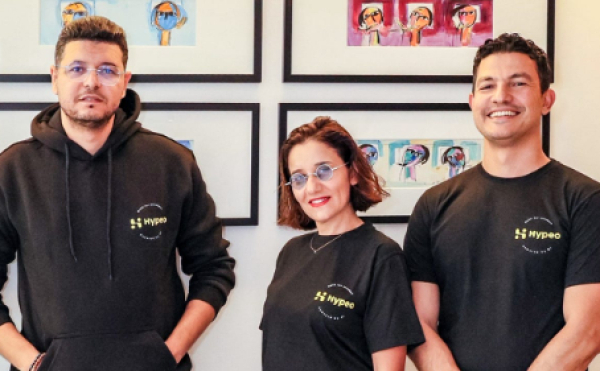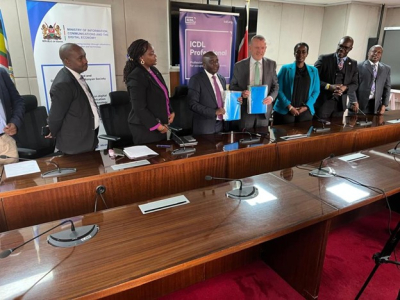A finance specialist, she is using technology to transform the mental health sector and address the growing psychological challenges faced by the population.
Onkgopotse Khumalo, a finance graduate and entrepreneur from South Africa, is the founder and CEO of Amari Health, a digital mental health startup.
Founded in 2019 as The Pocket Couch, Amari Health aims to improve access to mental healthcare in Africa through a digital platform that is accessible and adapted to local cultural contexts.
The platform uses advanced technologies, including artificial intelligence, to connect users with qualified mental health professionals in under five minutes. It offers services in several South African languages, reflecting a strong commitment to cultural sensitivity and inclusivity. This approach is designed to overcome traditional barriers to care, such as high costs, social stigma, and the scarcity of specialized services.
Amari Health serves both individuals and companies that want to offer psychological support to their employees. The startup’s digital tools provide personalized tracking and daily mental wellness management.
Before creating Amari Health, Khumalo founded Sequoia Consulting Services, a business support company, in 2018, where she served as CEO until 2024. She holds a bachelor’s degree in finance from the University of Cape Town, which she earned in 2013.
After graduating, she joined the investment management firm Afena Capital in 2014 as an investment analyst intern. She also worked as an investment analyst at financial services company Absa Group. In 2016, she joined the management consulting firm McKinsey & Company as a management consultant. In 2018, she worked as a special projects manager for the Awethu Project Holdings incubator.
Melchior Koba
Hypeo AI, a digital solution developed by Moroccan startup Phoenix AI, uses artificial intelligence to help companies connect with real and virtual influencers. The Casablanca-based startup was founded in 2024 by Meriam Bessa, Oussama Sekkat, and Salah Eddine Mimouni.
"Our region has no shortage of talent. What was missing was an intelligent infrastructure," Meriam Bessa said. "We are developing tools that allow brands and creators to meet more quickly, match better, and work smarter through the power of AI."
Hypeo AI streamlines the creation, management, and tracking of online marketing campaigns. Brands can automatically identify influencers who are a perfect match for their image, get tailored price recommendations, generate personalized briefs and scripts, and monitor campaign performance in real time. This automation eliminates fragmented practices, manual tracking, and back-and-forth communication between platforms.
The solution's goal is to make influencer marketing a fluid, digital, and optimized process, providing regional companies and creators with accessible tools adapted to local realities. Through its infrastructure, Hypeo AI facilitates faster, fairer, and more organized interactions. The startup also has its own virtual influencers, including Kenza Layli and her 200,000 followers.
Adoni Conrad Quenum
eDariba is an Egyptian fintech startup with an all-in-one solution that centralizes and automates key aspects of tax compliance, positioning itself as an assistant for digital transformation in the field. The startup was founded in 2023 by Maged Rawash.
eDariba’s cloud-based platform covers the entire tax cycle, including the creation and submission of electronic invoices, VAT declarations, automated payrolls, advanced tax reports, and AI-assisted product coding. Data is synchronized in real time with the official Egyptian tax platform, ensuring continuous availability.
The service allows accounting firms to optimize their time, increase productivity, reduce the risk of errors, and ease administrative burdens.
The fintech, which complies with regulatory requirements, is supported by the Start IT (ITIDA) incubator, as part of a program designed to boost the digital transformation of small and medium-sized enterprises (SMEs) and freelancers. eDariba and seven other Egyptian startups received about 480,000 Egyptian pounds (around $9,900) in financial and technical support to help accelerate their adoption by businesses.
Adoni Conrad Quenum
In August 2025, South African startup Flood secured a $2.5 million funding round from various angel investors to accelerate its expansion across the continent and beyond.
Flood, a digital solution from a South African startup, is helping telecommunications companies, banks, and other businesses instantly integrate commerce features into their existing applications. The company has developed a mobile-first, "SuperApp-as-a-Service" (S-AaaS) platform driven by an application programming interface (API), which allows for no-code integration. The Cape Town-based startup was founded in 2020 by André de Wet and Shashank Jain.
According to co-founder André de Wet, the platform aims to address a dual challenge: making small businesses more visible in the digital space while helping telecommunications companies and banks attract more engaged customers. De Wet explained that Flood adds a commerce layer to existing self-service apps, which helps increase platform usage by offering payment and loyalty features.
By targeting companies with a large user base, Flood provides an end-to-end e-commerce platform that handles products, services, payments, logistics, loyalty, and analytics. The platform connects online and offline commerce through key tools like rapid merchant onboarding, loyalty programs, product discovery, in-store pickup, QR codes, and real-time analytics.
The goal is to increase the visibility of brick-and-mortar small businesses on popular apps, digitizing a market that remains largely offline. This also transforms telecom and banking apps into local marketplaces. Currently operating in South Africa, India, and Singapore, the startup plans to expand to Ghana, Mauritius, Panama, Puerto Rico, Turkey, and Tanzania.
Adoni Conrad Quenum
With stablecoin adoption accelerating worldwide — from cross-border remittances to B2B trade and payouts to gig workers — Mastercard is making a calculated bet that tokenized money will become a mainstream part of the payments landscape.
Mastercard and Circle, issuer of USDC stablecoin, have announced an expanded partnership that will allow acquiring banks in Eastern Europe, the Middle East, and Africa (EEMEA) to settle transactions in USDC and EURC, fully reserved stablecoins issued by regulated Circle affiliates. The move, announced August 26, marks the first time acquirers in the region can settle directly in stablecoins, a milestone that could transform cross-border trade and digital payments.
“This partnership is a pivotal step toward truly borderless, real-time commerce,” said Kash Razzaghi, Chief Business Officer at Circle. “By leveraging Mastercard’s global network, we can extend the benefits of stablecoins beyond crypto-native use cases into mainstream finance.”
Dimitrios Dosis, president of Mastercard EEMEA, added: “Our work with Circle is part of Mastercard’s commitment to bring digital assets safely into the financial mainstream. By embedding compliance and trust into stablecoin settlement, we’re enabling faster, more secure transactions for businesses and consumers across the region.”
The launch comes at a crucial moment for the region. According to the World Bank, the global average cost of sending $200 stood at 6.4% in Q4 2023—more than double the UN SDG target of 3%. Digital remittances averaged 5% versus 7% for cash-based methods, highlighting the savings technology can deliver. Stablecoin settlement could lower costs even further while cutting transfer times from days to near real-time. For small businesses and merchants, this means quicker supplier payments, stronger cash flow, and greater protection against currency volatility.
Beyond remittances, the model could benefit gig workers, creators, and SMEs across EEMEA who struggle with delays and fees in receiving international payments. Faster, cheaper, and more secure payouts have a direct impact on household incomes and business growth.
The partnership builds on Mastercard’s broader digital asset strategy, supported by its Multi-Token Network, Crypto Credential, and Crypto Secure platforms. Stablecoins—cryptocurrencies pegged to assets such as the U.S. dollar or euro—have gained traction as a reliable alternative to volatile tokens like Bitcoin. The sector’s market capitalization reached $166 billion by June 2025, according to the Stablecoin Industry Report: Q2 2025. In EEMEA, where inflation and costly remittances are persistent challenges, adoption is accelerating. Institutional moves like Mastercard and Circle’s expansion could push stablecoins firmly into mainstream finance.
For Mastercard, enabling regulated stablecoin settlement is not just a technical milestone but a strategic play to expand its role as a trusted bridge between blockchain and traditional finance, while tapping into new growth opportunities in emerging markets.
Hikmatu Bilali
The MoU establishes a strong framework for collaboration in equipping Kenyans with internationally recognized digital skills certification, ensuring the country is well-positioned to harness digital opportunities and accelerate its path toward a knowledge-driven economy.
Kenya has signed a Memorandum of Understanding (MoU) with the International Certification of Digital Literacy (ICDL) Africa, a digital literacy provider that offers certification programs that verify an individual’s proficiency in essential computer skills. The agreement, announced on August 26, was finalized at a ceremony held by the Ministry of ICT and Digital Economy (MICDE). It aims to advance digital skills development across the country.
Speaking at the ceremony, the Principal Secretary of MICDE underscored the government’s commitment to investing in digital infrastructure and the digitization of public services. He emphasized that building a digitally skilled population—particularly among the youth—will be critical for unlocking opportunities in the growing Business Process Outsourcing (BPO) sector, as well as emerging fields such as software development and Artificial Intelligence.
“ICDL certification will play a vital role in developing the talent pool Kenya needs to compete and thrive in the digital economy,” the PS noted, adding that the Cabinet Minister has given full backing to the partnership.
ICDL CEO Damien reaffirmed the organization’s dedication to supporting Kenya’s digital transformation journey: “A digital economy can only be achieved through digitally skilled people, and ICDL has been building those skills globally for many years.”
The MoU aligns closely with Kenya’s Digital Masterplan 2022–2032, which seeks to digitize 80% of government services over the next decade. While investments in infrastructure and platforms are critical, their impact depends on citizens and civil servants having the right skills to adopt and use them effectively. By introducing internationally recognized ICDL certification, the partnership ensures that Kenyans—particularly youth—are equipped with practical digital competencies in areas such as productivity tools, cybersecurity, and online collaboration.
This comes as Kenya intensifies efforts to position itself as a regional hub for digital and AI-driven governance. Just last week, the government launched an ambitious plan to equip 100,000 public servants with AI and digital competencies through the Regional Centre of Competence (RCOC) based at the Kenya School of Government for Digital and AI Skilling.
These efforts underline Kenya’s commitment to building a future-ready workforce and accelerating its digital transformation agenda.
Hikmatu Bilali
-
Collins Fomba Ken founded Iwomi Technologies in 2015 to drive financial inclusion.
-
The company develops digital banking platforms and consumer apps for payments and money transfers.
-
Its products include mobile banking, loan management, instant remittances, and e-commerce tools.
Collins Fomba Ken, a Cameroonian computer engineer and entrepreneur, is the founder and CEO of Iwomi Technologies, a fintech company focused on building digital solutions for African banks and consumers.
Since its creation in 2015, Iwomi Technologies has developed platforms designed to improve financial inclusion and meet the needs of financial institutions as well as everyday users. The company offers a wide range of products and services.
For businesses, Iwomi provides Digital Banking Suite, a full-service platform that supports digital banking operations, and My Bank, a mobile and web application with an integrated wallet currently undergoing certification with Gimac, Visa, and MasterCard. Iwomi Core enables interoperability between banks and third-party services, while the Mosa system ensures secure processing and tracking of online bank loans, allowing clients to manage credit remotely.
For consumers, the company offers Softeller, an application for instant money transfers from abroad to mobile money accounts, mainly in Cameroon. It also provides bill payment services for utilities such as ENEO, Camwater, and Canal+, and IMarket, an e-commerce management platform that helps stores track orders and catalogs while offering installment payment options.
Fomba Ken holds a master’s degree in computer engineering from the National Advanced School of Engineering in Yaoundé, obtained in 2010. His career began in 2009 with an internship at Commercial Bank Cameroun. Between 2010 and 2012, he worked as a software engineer at Delta Informatique and Sopra Banking Software in France. After returning to Cameroon, he joined Société Commerciale de Banque (SCB Cameroun), where he served as a software engineer from 2012 to 2016.
With his startup ShipAfrica, he is betting that integrated logistics and payment tools can unlock e-commerce growth for small and medium-sized businesses.
Nigerian entrepreneur Walter Isoko is the founder and CEO of ShipAfrica, a technology company specializing in logistics and e-commerce solutions for the African market.
Launched in 2022, ShipAfrica offers integrated services for transportation, payments, and order management for both sellers and buyers on the continent. The company aims to address persistent supply chain and online commerce challenges in Africa. Its platform focuses on automating logistics workflows and simplifying payments, connecting small and medium-sized businesses to local and international markets with access to organized logistics and enhanced commercial visibility.
Before founding ShipAfrica, Isoko co-founded Flux Technology Africa in 2015, where he served as CEO until 2021. The company developed complex software systems and payment solutions for small and medium-sized enterprises (SMEs), universities, commercial banks, and public administrations.
Isoko, who holds a degree in mathematics and statistics from Ambrose Alli University in Nigeria, also served as a partner for technology and growth at Teksight Edge Ltd from 2018 to 2021. The agency collaborated with companies in finance, technology, energy, construction, and electronics. From 2021 to 2023, he was the director of growth and partnerships at Terminal Africa, a logistics platform.
From 2018 to 2021, Isoko was also an ambassador for the 25under25 Awards by SME100Africa, an initiative dedicated to supporting young entrepreneurs on the continent.
Melchior Koba
The new platform from PayLogic enables interoperability between banks and mobile money wallets, a critical step for financial inclusion in a nation where cash is king.
Global payment solutions provider PayLogic announced on Monday the launch of the National Payment Switch, a new national payment system in the Comoros. The operational platform aims to reduce the country's reliance on cash and accelerate financial inclusion.
"The successful go-live of the National Payment Switch in Comoros reflects PayLogic’s commitment to advancing secure and interoperable payment infrastructure across emerging markets," said Mohamed Mekouar, PayLogic's executive chairman. "By partnering with central banks and financial institutions, we help deliver systems that drive inclusion, efficiency, and long-term financial innovation."
The platform provides interoperability between banks, microfinance institutions, and mobile money operators, enabling real-time digital transactions such as transfers, merchant payments, and remittances from the diaspora. The goal is to reduce dependency on cash and make financial services more accessible for both households and small businesses.
This initiative is part of the Financial Sector Development Support Project in the Comoros, which is backed by the World Bank. It comes as financial inclusion remains limited in the archipelago. To address this, the Central Bank has launched a policy of free bank account openings for individuals and fee-free money transfers for the diaspora. The objective is to raise the banking rate to 50% by the end of 2025.
However, several challenges could hinder the system's success. Internet penetration remains low at 35.7% as of early 2025, despite relatively high mobile coverage at 77.6%. Public distrust of digital payments could also slow adoption. The project's success will ultimately depend on financial institutions' ability to offer services that are accessible, affordable, and tailored to local needs.
With this launch, the Comoros joins a growing list of countries that have selected PayLogic as a partner for their national interoperable payment switches, including Lesotho, Eswatini, and six central African states through a regional switch.
Samira Njoya
Orange Egypt has announced a partnership with Saudi Arabia’s fintech company, Enjaz Payment Services, to expand its international remittance services and make money transfers from Saudi Arabia to Egypt easier, faster, and more rewarding.
Through this collaboration, customers can now send money from Enjaz branches or the Enjaz app directly to Orange Cash wallets in Egypt with zero transfer fees. In addition, receivers in Egypt will benefit from an exclusive cashback reward of EGP 500 once the transfer is completed.
The new service strengthens Orange Cash’s cross-border capabilities, which already cover transfers from Jordan, Kuwait, the UAE, Qatar, and Oman. It also reflects Orange’s commitment to supporting Egypt’s digital transformation strategy and advancing financial inclusion by providing secure, convenient, and affordable digital financial solutions.
More...
For Egypt, local handset assembly isn’t just about industrial policy—it’s a key enabler of digital transformation. By making devices more affordable and accessible, Egypt accelerates internet adoption, strengthens its digital economy, and positions itself as a regional player in Africa’s digital future.
Egypt’s mobile handset market sales are forecast to climb from an estimated USD 2.5 billion in 2025 to more than USD 4.8 billion by 2031, reflecting a compound annual growth rate (CAGR) of 11.4%, according to new industry forecasts by Fitch Solutions published August 14. This expansion is being powered by a surge in local phone assembly, supportive government policies, and growing demand for affordable smartphones.
According to the report, Egypt is fast emerging as a regional handset production hub, eventhough it was once heavily reliant on imports. Global brands including Samsung, Oppo, Vivo, Xiaomi, and Nokia have established assembly lines in the country, complementing the pioneering efforts of local firm SICO, which launched the first domestically made smartphone, the Nile X, in 2019. By 2022, Samsung rolled out its first “Made in Egypt” Galaxy A13 at its Beni Suef plant, while Oppo and Vivo committed over USD 30 million each to new factories. Xiaomi followed with its first Middle East facility in 2023, and Nokia partnered with SICO for joint assembly projects.
This wave of investment has pushed Egypt’s installed handset production capacity to 11.5 million units annually as of 2024, backed by more than USD 87 million in capital and the creation of over 2,000 jobs. Actual production, however, has lagged at around 3 million units per year, reflecting a utilisation rate of just 26%. Industry forecasts suggest that while utilisation could rise to 80% by 2031, a capacity gap of 3.2 million units will likely remain.
The shift to local assembly has dramatically reshaped trade flows. Imports of finished mobile devices fell from USD 1.8 billion in 2020 to just USD 54 million in 2024, even as imports of electronic components surged to feed local assembly lines, the report reveals further. This aligns with the government’s “Egypt Makes Electronics” initiative, which combines tariff hikes on finished handsets with incentives for domestic production, including moves to ease taxes on imported components.
Macroeconomic pressures are also reinforcing demand for locally made, low-cost smartphones, the report adds. The Egyptian pound’s sharp depreciation, from under EGP 20/USD in 2022 to over EGP 50/USD by 2025, has made imports less affordable, while inflation – which peaked during the 2022–2024 crisis – is projected to ease to an annual average of 6.5% from 2025–2031. Combined with GDP growth expected to average 4.3% annually, the outlook points to a stable but price-sensitive mass market, particularly for devices under USD 150.
Despite these gains, structural challenges continue to hold back Egypt’s handset ambitions. Supply-chain disruptions, customs delays, foreign exchange shortages, and persistent inflationary pressures limit capacity utilisation. Moreover, limited consumer incomes, rural smartphone penetration barriers, and geopolitical risks – from Red Sea freight disruptions to regional tensions – remain hurdles for sustained growth.
Still, analysts note that closing the production gap could unlock significant economic value, allowing Egypt not only to fully meet domestic demand but also expand exports across Africa and MENA. With major brands already invested and the government actively courting new entrants – including Apple for potential iPhone assembly – Egypt is positioning itself as a competitive electronics manufacturing hub for the region.
Affordable mobile phones are the gateway to fintech, e-government, e-commerce, and online education—all fast-growing sectors in Egypt’s digital economy. Scaling up local production will not only drive device adoption but also accelerate digital inclusion, positioning Egypt as both a leading consumer and an exporter of mobile technologies in Africa and the Middle East.
Hikmatu Bilali
Passionate about tech innovation, he is a key player in the digital transformation of African businesses. Through his initiatives, he simplifies complex processes and paves the way for more efficient financial management for small businesses.
Sidney Rema is a Kenyan entrepreneur with a unique background in both software engineering and medicine. He is the co-founder and chief executive officer of Patika, a startup that helps small African businesses automate their payment and receivables management.
Founded in 2021, Patika aims to reinvent financial management for small and medium-sized enterprises across Africa. Its platform automates invoicing, payment tracking, and order management, which helps to minimize errors and payment delays. The solution is specifically designed to meet the needs of African businesses with a simple interface adapted to the local context. In addition to payment management, Patika offers tools that enhance business efficiency by facilitating data-driven decision-making in real time. This digitization is intended to accelerate the growth of small businesses and strengthen their financial inclusion.
Rema is also a co-founder and non-executive director at Kuza Lab Ltd, a software development company founded in 2017. The firm provides IT solutions to both established institutions and emerging technology players. Prior to these ventures, Rema co-founded VoSpine in 2015, a social networking platform where he served as CEO until 2015. In 2017, he also launched Meal Time Company, an enterprise specializing in digital solutions for the restaurant industry, which he led until 2018.
Rema holds a Bachelor of Science in Computer Science and Business Management from the University of Nairobi, graduating in 2018. He also earned a Bachelor of Science in Medicine, Surgery, and Information Technology from the same university in 2019. His professional career began in 2013 as a credit agent at Equity Bank Ltd in Kenya. In 2017, he became a senior project management consultant at INB Management & IT Consulting, an information technology company based in Mogadishu, Somalia, and Kenya. He went on to work as an operational strategy and marketing consultant for Gomma Lotto Kenya, then as a growth strategy consultant for Dandia Doh Lottery in 2019.
Melchior Koba
-
AfDB, Japan’s Aerosense partner on drone-based infrastructure management
-
Drones to support road maintenance, disaster response, agriculture, health
-
Initiative tackles Africa’s infrastructure deficit, boosts trade and resilience
The African Development Bank (AfDB) and Japanese drone company Aerosense Inc. signed a letter of intent on Thursday, Aug. 21, to promote the use of drone technology in managing Africa’s infrastructure. The agreement was concluded on the sidelines of the ninth Tokyo International Conference on African Development (TICAD9) in Yokohama, Japan.
"The program is a bold response to Africa’s growing infrastructure challenges. By partnering with Aerosense, we will not only promote efficient road management but also consider promoting other unique solutions such as disaster management, river/flooding control, agricultural sensing, and medical equipment delivery," said Solomon Quaynor, AfDB's Vice President for Private Sector, Infrastructure and Industrialization.
Under the agreement, the AfDB will coordinate relations with African governments, facilitate project financing and build local capacity. For its part, Aerosense will conduct feasibility studies and adapt its drones to local geographical and logistical conditions. The company's technology was selected in June 2025 as part of the Sustainable Road Maintenance Program for Africa (SRMPA), where it will be used to collect precise data on road conditions to facilitate more efficient and less costly predictive maintenance.
The initiative comes amid a chronic infrastructure deficit on the continent. According to the Africa Finance Corporation’s "State of Africa’s Infrastructure 2024" report, the majority of paved roads are concentrated in the continent's northern and southern regions, with nearly 40% of the total in South Africa and Algeria. Every year, Africa loses up to 2% of economic growth due to the poor quality of its infrastructure. Climate change further accentuates this vulnerability, as seen in 2022 when floods in Nigeria destroyed more than 100,000 hectares of farmland and damaged several strategic road arteries.
The use of drones in African public services has already proven effective. In Rwanda, Zipline has delivered more than 500,000 bags of blood to remote areas, while in Ghana and South Africa, drones are used for vaccine distribution and agricultural surveillance. The AfDB-Aerosense agreement aims to expand these applications, particularly for road maintenance, a strategic sector for intra-African trade often slowed by logistics bottlenecks.
Ultimately, the widespread deployment of drones could transform infrastructure management and climate risk prevention on the continent. Regular aerial surveillance would not only reduce maintenance costs but also build resilience in the face of disasters, while promoting economic development and the fluidity of regional trade.
Samira Njoya
The National Information Technology Development Agency (NITDA), in partnership with the Final Year Committee of Abubakar Tafawa Balewa University (ATBU), has launched a capacity-building program in Bauchi State aimed at strengthening digital literacy and preparing students for life after graduation.
The initiative, themed “Upskill for Employability and Self Reliance,” seeks to equip students with both foundational digital literacy and advanced technological skills. It also provides practical guidance to support innovation, job creation, and wealth generation as part of efforts to prepare graduates for Nigeria’s rapidly evolving digital economy.
The program reflects NITDA’s broader mandate to drive Nigeria’s digital transformation agenda and aligns with the agency’s initiatives under the National Digital Economy Policy and Strategy (NDEPS), which prioritises digital literacy and skills as a cornerstone for sustainable growth.















